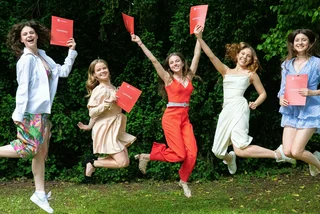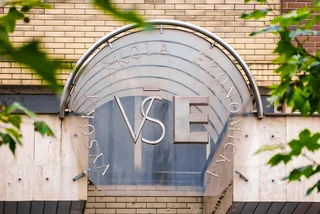When David Lawlor moved to Prague in 2004 to join his wife on an exciting new adventure in international teaching, he never imagined that 18 years later, having set down roots and embarked upon a career in educational leadership, he would be leading the Secondary program in one of Prague’s foremost International schools.
David, whose career in education spans over two decades, began teaching at the now Prague British International School (PBIS) in 2004 and became Deputy Head Academic for the senior school in 2018. This year he became the first Head of Secondary across all three of the school campuses. The role allows him to combine his professional and personal life in a unique way as his two daughters attend the school along with his partner of 24 years who is Head of Year in the primary school.
We recently spoke to David about his role in developing a curriculum that puts students' passions at the forefront of learning while ensuring each journey is personalized. He also told us about the changing needs of education during his years at PBIS, which next year celebrates its thirty-year anniversary and his vision for the next thirty.
First things first: What’s it like going to work every day with your wife and two daughters?
I’m very fortunate. My oldest daughter is in senior school and my youngest is in primary, so as a parent, I see the holistic picture of my children’s school experience. I get to travel to work with my family and be a big part of their lives at home and school. I feel blessed to be there to experience those important moments in their school lives.
You say holistic. What does that look like?
“Holistic” means my children get to experience a global community at PBIS. Being part of Nord Anglia Education allows my children to learn in Prague but also take part in events like STEAM, Sports, Performing Arts Festivals, and UNICEF Global Goal Initiatives alongside peers in NAE schools across the globe. Their education is more than academic, with enrichment playing a big part in their lives, while they also learn about themselves and their role in the world. This holistic education nurtures my children’s growth and helps prepare them for their futures.
I imagine your positive experience also says a lot to other parents whose children attend PBIS.
I know it does. As a school leader, I’m committed to driving the school forward academically and pastorally and as a parent, I am heavily invested in creating a great learning environment for my own, and all, children at PBIS. Parents take a lot of heart from my role as both educator and parent. I want PBIS to be great for my own children and also their children.
How does one go from being a Computer Science teacher to Head of Secondary? Is there a natural progression between teaching computer networks and devising personalized curriculums?
I have an analytical mind combined with a love for building relationships with people so I’m naturally drawn toward leadership. I don’t like to sit still and instead I prefer to innovate and look for better ways of doing what we do to achieve our best. I’ve held various middle leadership roles over the years in both academic and systems aspects of the school so the progression to Deputy Head and now Head of Secondary has been a natural evolution and presented a new challenge for me.
So your role is in a sense to ‘program’ a path for individual kids.
The big focus for me is on making sure that each individual student at PBIS has a personalized learning journey that is an educational pathway suitable for them. I support the academic program of our senior students as they undertake IGCSE and IB studies. This involves deciding on the right combination of subject choices, monitoring progress, providing academic guidance, and helping students and their parents take full advantage of all that PBIS has to offer.
How do you support them to make these choices in practice?
A big part of that choice process is fast-forwarding to the very end of their time with us at PBIS and focusing on their career and future aspirations. We like to work backward from that aspiration and then tailor their learning journey to their needs. Of course, young people are continually developing so we also have to be responsive, refining the pathway as they grow. For example, we have our Options Evening coming up which will showcase all the potential subjects students can choose from and help with their future planning for university or career choices. This event takes place on Jan. 26, so come along and find out what we can offer your child.
And your role has now changed to be in charge of secondary across all three campuses. What are the challenges in that?
It’s an exciting challenge. One of the goals is to continue to build an impactful vertical curriculum and education that ensures continuity and progression from Primary school into secondary school and through to IB Diploma. A big challenge that we face now is devising a robust curriculum that allows for academic success but also provides space for students to build resilience and character as they develop into young adults. We nurture creativity and confidence, instilling a strong belief in all students that with focus and determination, they can create their own futures. At PBIS we have three campuses but we are united behind this one school philosophy.
From what I know of the school it’s that environment, in addition to academic success, that makes PBIS stand out.
Over the years, I have watched PBIS develop, and here there is this beautiful way in which every student feels like they’ve always belonged here, new and old, they all feel settled and part of our community. Very quickly we see new students feel and act as part of the PBIS community. We have a great staff team and a strong culture of parent partnership that ensures our parents know that we're all on this journey with their children together.
What are some of the most important lessons you’ve learned from working in the international school environment?
One of the exciting things about working at an international school is learning from other teachers. Different teachers that join us come from a variety of international education systems that have different pedagogies and approaches that enrich learning. When new teachers join us, they bring these new methods and ideas and every time you think you've done something well you find another perspective that makes you reimagine what you could do.
We expect the students to be resilient and adapt to new learning so it’s important that we change and adapt with them as teachers. See what's been done, build on it, and then change the underpinning principle of what we should be not just as educators, but as facilitators of inquiry-based learning. As a teacher, I've made the transition to understanding that I'm not always the most knowledgeable person in the classroom.
On Jan. 26, PBIS will showcase all the potential subjects students can choose from and help with their future planning for university or career choices during their Options Evening at the Libus campus for IGCSE and IB Diploma students.
How does PBIS intend to keep that forward momentum going?
Our goal is to promote a streamlined curriculum that provides students with more time to learn what they love while using enrichment opportunities to help us underpin an individual approach to learning. As the Head of Secondary, my role is to ensure the vertical alignment of our approach throughout the senior years.
We are excited as we strip back the subjects that we know by heart and instead unpack the very pedagogies that underpin learning. Questions such as “What does it mean to be a linguist?” and, “What does it really mean to ‘understand’ mathematics?”. At PBIS we are doubling down on the core building blocks of learning and this resonates with the kids.
For you, what is the best possible outcome of stitching that vision together?
My motto is that everything is within reach if you set your mind to it and have enough drive to achieve it. Having made that true impact and helped students believe in themselves, the reward is then having the same students contact me who’ve gone on to secure degrees and enter the workplace in some exciting industries – that's what I want for my own children, to believe that anything is possible.
As a school, we’ve made massive strides to show our students that they can achieve whatever they want with perseverance and resilience. I’m an Irishman and with that comes a hard work ethic and a charming outlook on life that sees the possibilities in everything.
How has the life of an Irish family changed after 18 years in the Czech Republic?
We’ve made the expat move from the center of Prague to Czech village life around 10 years ago now. What I love about living with rural Czech people is their very upfront attitude. You know where you stand no matter how charming you can be. Our kids are becoming more confident in speaking Czech and we’ve met some great friends even with the language barrier. My wife and I are both Irish and we’ve lived away from our biological homes for over 25 years now so we are rooted here and we wouldn’t have it any other way.
It sounds like students, staff, and teachers feel that same close-knit vibe at PBIS.
As a teacher, I'm very fortunate as I can have an impact on children's lives as an academic leader but the entire school has got a family feel to it as we all look out for each other. We are looking forward to the future, to the next thirty years of PBIS.
This article was written in cooperation with Prague British International School. Read more about our partner content policies here.












 Reading time: 7 minutes
Reading time: 7 minutes 






















